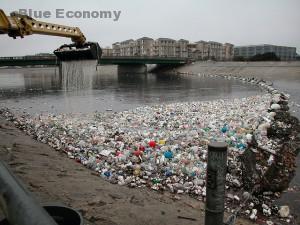Using Knowledge, Policies, and Innovation to Improve Lives
Plastics are here to stay. They are easy and inexpensive to make and have been a significant driver for development. But plastic waste has become an omnipresent threat – with public health, livelihoods, and the environment all suffering. Plastic can take hundreds of thousands of years to decompose and is already becoming a part of our fossil record.the World Bank reported
Africa

The fishermen of Bargny, on a sheltered bay on the coast of Senegal, understand these consequences all too well. Serigne Abass Pouye faces the problem every time he goes out for the day.
“What do we see most at sea? Plastics everywhere,” says Pouye.
Their fishing grounds are now infested with plastic waste, reducing their catch. Turtle breeding sites on the beach are so cluttered with trash that hatchlings die because they cannot reach the water. Damage to the ecosystem is compromising biodiversity – negatively impacting the lives and livelihoods of the residents here. At times, bundles of plastic jam and damage the boats, making it difficult to work at all.
Serigne Abass Pouye, a fisherman from Bargny, Senegal, sits with pride in his boat. He has been a fisherman all his life and depends on the ocean.
“As soon as we leave the shore, plastic gets tangled in our boats, which can capsize and break. All the plastic from the land goes into the sea. Discarded fishing nets also bundle up, block our boats and invade marine habitats,” says Bargny resident Abdou Rahman Wade.

Southeast of Bargny, resting on the Saloum river, people in the port city of Kaolack face similar challenges on land.
When it rains, drains clog with plastics, flowing into streets and homes.
Rivers of plastic flow where children play and the stagnant water becomes host to water-borne diseases.
Women who raise cows or goats as income for their households also suffer, as their livestock consumes the plastics that contaminate the landscape and are sickened or die – taking a huge toll on a family’s wealth.

Ndiouck Mbaye, President of the Rural Women’s Association in Kaolak, expresses the frustration felt by so many:
“We are tired of seeing plastic in our lives. It is everywhere and it has many negative impacts. When you go into the forest, plastic is mixed in the soil, killing our flora. Nothing can grow. It often kills our cattle, our only treasure. Our drains are infested with plastic, making kids and adults sick. “
Despite these persistent challenges, Senegal has also had some successes in addressing the unrelenting problem of plastic waste. Take Mbeubeuss, the main dumpsite for the lively capital region of Dakar.
Opened in 1968, it is now one of the largest open dumps in west Africa, serving nearly 4 million people by taking in 475,000 tons of waste a year. Situated near both a major city and the sea, it has become a major source of air, land, and water pollution.

Waste is both a serious problem and an opportunity for the region. Take the $220 million West Africa Coastal Areas Program (WACA) for example, which supports countries in curbing marine plastic pollution, creating finance opportunities, developing innovative solutions, and spurring citizen engagement to make coastal communities more resilient.
Unlike other litter, there are ways for plastic to be repurposed and have continued value, but this requires proper sorting and processing.
At Mbeubeuss, more than 2,500 people do just that, thanks to a $125 million credit from the International Development Association to support the Municipal Waste Management Program. The project is designed to help these waste-pickers with social, entrepreneurial, and skills development. The project also funded a recycling facility on the site to improve the management of the recycling process.
With better treatment of the waste, more material can be exported to manufacturers making rugs, clothes, furniture, and other products.
More waste is reused, less contaminates the landscape and ocean, and livelihoods are boosted.

The “Big Picture” Challenge
Unfortunately, the problems faced by Senegal are not unique. Over the last 60 years, 8.3 billion tons of plastic have been produced around the world, but only 9.5% of it has been recycled.
The remaining 7.5 billion tons have been left to pile up on land and clog waterways. Furthermore, most plastic is for single-use items – meaning its usefulness is very short while its lifespan is very, very long. And there are only so many things that can be done with plastic once it is created.
Today, the production of plastic far outpaces our ability to manage it when it becomes waste, and the current amounts are expected to triple by 2050. The detrimental effects of plastic pollution touch every living thing across every ecosystem on the planet. It is inescapable and has negative impacts on health and livelihoods – not to mention the cleanliness of communities around the globe.














